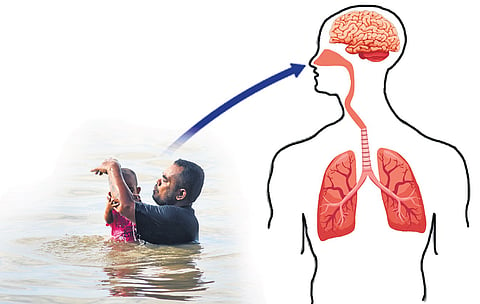

KOCHI: Kerala reported multiple cases of amoebic meningoencephalitis, a rare central nervous system infection caused by free-living amoeba found in freshwater, lakes, and rivers in July and August. Amoebic meningoencephalitis is a disease that develops several days after exposure to the contaminated water source and may cause death within one or two weeks of infection, mostly because of rapid onset and delayed diagnosis.
There are primarily two types of amoebic meningoencephalitis; Primary amoebic meningoencephalitis (PAM) Granulomatous amoebic encephalitis (GAE)
Primary amoebic meningoencephalitis is usually caused by infection with Naegleria fowleri, a microscopic amoeba, also known as brain-eating amoeba. The fatality rate of the disease is more than 97%. It enters the human host via the nose and follows the nasal passage while swimming, diving, bathing or playing in warm, usually stagnant fresh water. The disease mostly affects children and young adults, mostly during warmer months.
GAE mostly results from hematogenous seeding of the central nervous system following primary infection of the lungs or skin by B mandrillaris, acanthamoeba, or aappinia species
The symptoms of the disease are similar to bacterial meningitis and include, Headache Fever Nausea Vomiting Dr K P Vinayan, head of the Pediatric Neurology Department at Amrita Hospital, says further tests and understanding of the history of exposure can help diagnose the condition.
“Once the patient is presented with the symptoms, we may check the history of exposure, whether the child was engaged in swimming or diving or even playing in water. However, we have only a few literature and reports on amoebic meningoencephalitis to refer to. We conduct a series of studies to see whether amoeba is present and to identify the disease at the earliest,” he said, adding that cerebrospinal fluid (CSF) is tested for every meningoencephalitis case as several cases have been reported in the state.
Along with medicines, supportive treatment is also essential as the disease leads to significant brain swelling. For any disease that affects the brain, good ICU care for the modulation of the body’s immune system and supporting the brain system is important.
“We give specific therapy according to the condition of the patient. The complete recovery period may differ from patient to patient. They may also need to continue physiotherapy and follow-up check-ups for a few more months,” added Dr Vinayan, who also treated a 14-year-old boy who was suffering from amoebic meningoencephalitis (caused by vermamoeba vermiformis).